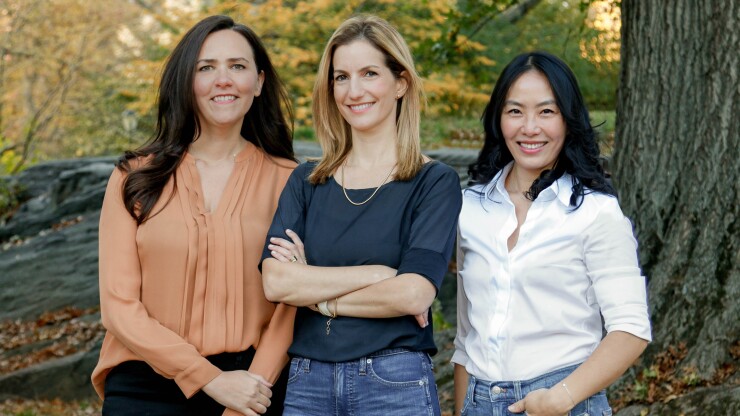
It may seem like a tough time to start a fund that invests in financial technology, given that many potential disruptors have had to cut back severely in recent months. But three former Amex Ventures managing directors say there's an opportunity in working with startups that have no desire to displace the incumbents.
Vesey Ventures, an $80 million fund, was recently founded by Dana Eli-Lorch, Lindsay Fitzgerald and Julia Huang. The firm is investing in early-stage fintech startups, with a focus on companies that can form fast partnerships with banks and payment companies.
Vesey's launch comes after the valuations of hundreds of fintechs fell 50% or more in a matter of months. This coincided with a decline in overall fintech investment,
While younger fintechs faltered, many incumbent banks and payment companies have posted largely solid earnings and are hiring staff. But these firms also face challenges in adopting new technology like artificial intelligence, or in managing emerging security threats. That's what Vesey is looking for — new technology that can help the more established firms adapt to market changes.
"A lot of the problems in fintech have been exposed," said Huang, a co-founder of Vesey Ventures, which was named for the street in Lower Manhattan where American Express is headquartered. "The incumbent firms have seen all of this before."
Vesey's initial investments include
"We're looking at identity protection, fraud," Huang said. "When the tide goes out you can see the weakness that was left behind."
Vesey's model expands on the work the co-founders did while at Amex Ventures. In their previous roles, Eli-Lorch, Fitzgerald and Huan backed firms such as Melio, Plaid, Stripe and Trulioo and forged more than 100 partnerships between startups and financial institutions.
Vesey's founders say they see value in supporting the incumbents rather than attempting to disrupt them.
"There are hundreds of very large financial institutions that have been around for more than a century. You can't ignore them," Fitzgerald said. "The incumbents still own the payment rails, the licenses and the massive customer bases. They want to innovate but can't always do that themselves. There's a synergy there."
While banks and fintechs were traditionally considered rivals, banks and established payment companies are more frequently
Despite these trends, there are challenges for fintech funds, according to Adrian Menoza, general partner and founder of Mendoza Ventures. Business-to-consumer fintechs continue to struggle and gain market share, since few have diversified their revenue beyond transaction fees.
"Most fintech funds have stopped looking at B2C deals due to this, so they have started to look at other adjacent spaces," Mendoza said, adding fraud prevention as an example.
Global fintech funding was $75.2 billion in 2022, or a 46% drop from 2021, according to
"The current environment makes our thesis front and center," said Fitzgerald. "The idea of working with a company that has institutional trust is strong."
While the economy appears difficult for fintechs, there are opportunities for investing since there are factors that could make the market less expensive for venture capital. During the long reign of easy money, a host of fintechs bent on changing the world were funded often at rich valuations, said Eric Grover, a principal at Intrepid Ventures, adding that in many sectors, there are too many fintechs, many of which aren't profitable and don't have enough capital to survive.
"The fintech herd is being culled," Grover said. "The good news is that established players can pick up some interesting assets for a song, and for VCs investing in fintech valuations should be more reasonable and talent more available."
Difficult times are when great companies are built, said Catheryn Chen, founder of Radiate Ventures, an investment vehicle that's launched last week week, with a focus on fintech, software-as-a-service and "deep tech," which develops products in fields such as food production and energy that attempts to solve climate change challenges.
"We as venture capitalists actually get a seat at the table at a more rational or reasonable valuation," Chen said. "We decided to raise the fund now exactly due to the timing of things. This is when you can invest in the next generation of companies solving real-world problems, especially in sectors that require long-term commitment and support from their investors."






